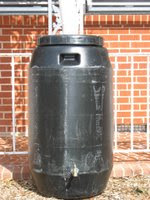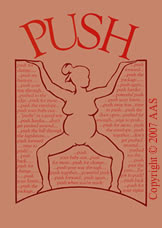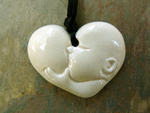It is SYSTEMS that I am against, not the people in the systems. It is the lack of social and political will to address the vagaries of our systems -- social services, education, political, and, yes, the medical and in particular, obstetrics -- that really concern me. The denial of the impact of medicalized birth -- drugs, interventions, surgery, disrespectful treatment -- on the baby, the mother, and the father keep us a wounded walking numb society of people.
Stories like the one below raise a lot of questions. The death of a young woman in childbirth (most likely a hospital birth in a military hospital where all of our best skills for obstetrics originate) says as much about our society than it does this one, lone traumatized soldier on the worst days of his life. This family's story highlights the disparaging, pitifully inadequate and harmful lack of political and social will and compassion for providing support for families. Families birthing, families with loved-ones deployed, families with a traumatic experience and loss of a family member. Here we have the collision of all three -- a mother dies in childbirth while her husband is serving in the war, and he kills the baby.
Where is the collective, compassionate commitment for caring for women, babies and the family in our society?
2006-11-28
Marine Arrested in Baby Son's Death
Associated Press
STATESIDE INCIDENT: 1 murder.
A 20-year old Marine who had been deployed to a training camp in Kuwait with the Ninth Communication Battalion from Camp Pendleton and who "was called back...to be with his ailing wife just before she died of childbirth complications was arrested on suspicion of murdering his newborn son."
He had previously told a local TV station that he "felt overwhelmed as a single parent of two and struggled to accept his son. `I didn't know how to feel about him. The same day he was born, my wife died,' he told KMPH in Fresno. `The feelings inside of me, I kind of wanted to push him away, but he's my son. My wife gave him to me.'"
His was jailed on charges of beating his 3-month old son. The death of his wife burdened him. He wrote on his personal web page, "For those of you who don't know, my beautiful wife ... died. Just because you see me smile and you see me laugh doesn't come close to the way I feel inside. I will never be as happy as I was until I'm with my wife again."
Where is the social regard for the importance of a woman birthing a baby and our families in the US having adequate resources during the child's infancy?
How can we not see the actions of medical birth are traumatizing to a woman, her baby, and her husband? How can we not see that our soldiers are asked to do what is beyond our comprehension while leaving their spouse and children home -- with substandard, if any support and care during and after their deployment? How can we not see that ANY grieving parent needs our compassion and truly adequate care and support. Once one leaves the hospital with a perfect, NICU, or deceased baby -- what is the responsibility of our society to support one another?? Can care and compassion be politicized or legislated as in George Bush senior's "Points of Light" that flickered and quickly sputtered or Billary's not-so-new or original concept of "It Takes a Village to Raise a Child." (published when I worked for the state of NY in 1999. We trained 100 such "villages" in the "Show Me" state - Missouri - in 1990 to address the drug problems in our communities, while the use of narcotics during the baby's birth has since increased to almost 80% of all births.)
When, oh, when, will we begin to examine the impact of medicalized birth on women and babies (boys, too) on increasing drug addiction, violence, depression, and apathy?
The natural, homebirth community tends to be more peer organized in local, grassroots groups that emotionally, physically, and spiritually support one another. Midwives, Doulas, LeLeche and Attachment Parenting type groups, Organic Foods, and other cooperatives seem to be providing ways for women and families to support others and to all receive support as equal community members.
We have a lot to learn from these communities that cannot be learned in "empirical studies" that steer social changes under the guise of fact in our psychological and medical caregiver's educations and programs. We have a lot to learn about reaching out to other human beings rather than donating money to a group or program to do so.
Reach out in love and compassion to a young birthing family, not with judgement, but with acts of kindness and generosity of time and support. One of the beautiful things of homebirth, midwifery, and doulaing is the nurturing of the mother whom one knows and values and the development of a true and caring relationship beyond those few hours of birth. Every doula and midwife I know would be there in a heart beat for any of her babies whose birth she participated. Has anyone had their OB come by with a meal and hold the baby or bathe your older child while you sleep? Do you invite you OB and L/D nurse to your baby's birthday party? How many more lives can be improved, and some actually saved by loving, caring compassionate, reciprocal, relational caring during the most critical time of a baby and family's lives and in times of need? I can't research it, and psychology and obstetrics won't do it, but I betcha the number is pretty high.
The Other Side of the Glass
Part One was officially released June 2013 in digital distribution format.
To purchase to to www.theothersideoftheglass.com
If you were a donor and want to download your copy send an email to theothersideoftheglassfilm@gmail.com.
The trailer
Wednesday, December 27, 2006
Subscribe to:
Post Comments (Atom)
"Soft is the heart of a child. Do not harden it."
A public awareness reminder that things that happen behind the scenes, out of our sight, aren't always as rosy as we might think them to be. Perhaps its a restaurant cook who accidentally drops your burger
on the floor before placing it on the bun and serving it to you. Here it's an overworked apathetic (pathetic) nurse giving my newborn daughter her first bath.
Please comment and rate this video, so as to insure that it is viewed as widely as possible, perhaps to prevent other such abuse. -- The mother who posted this YouTube. How NOT to wash a baby on YouTube
Are you going to try to tell me that "babies don't remember?" There is no difference to this baby's experience and the imprinting of her nervous system/brain and one that is held and cleaned by the mother or father either at the hospital or at home?
By the way, this is probably NOT the baby's first bath. The nurse is ungloved. Medical staff protocol is that they can't handle a baby ungloved until is has been bathed (scrubbed if you've seen it) because the baby is a BIO-HAZARD -- for them. Never mind that the bio-hazard IS the baby's first line of defense against hospital germs.
Missouri Senator Louden Speaks
Finally, A Birth Film for Fathers
Part One of the "The Other Side of the Glass: Finally, A Birth Film for and about Men" was released June, 2013.
Through presentation of the current research and stories of fathers, the routine use of interventions are questioned. How we protect and support the physiological need of the human newborn attachment sequence is the foundation for creating safe birth wherever birth happens.
Based on knowing that babies are sentient beings and the experience of birth is remembered in the body, mind, and soul, fathers are asked to research for themselves what is best for their partner and baby and to prepare to protect their baby.
The film is designed for midwives, doulas, and couples, particularly fathers to work with their caregivers. Doctors and nurses in the medical environment are asked to "be kind" to the laboring, birthing baby, and newborn. They are called to be accountable for doing what science has been so clear about for decades. The mother-baby relationship is core for life. Doctors and nurses and hospital caregivers and administrators are asked to create protocols that protect the mother-baby relationship.
Men are asked to join together to address the vagaries of the medical system that harm their partner, baby and self in the process of the most defining moments of their lives. Men are asked to begin to challenge the system BEFORE they even conceive babies as there is no way to be assured of being able to protect his loved ones once they are in the medical machine, the war zone, on the conveyor belt -- some of the ways that men describe their journey into fatherhood in the medicine culture.
Donors can email theothersideoftheglassfilm@gmail.com to get a digital copy.
Through presentation of the current research and stories of fathers, the routine use of interventions are questioned. How we protect and support the physiological need of the human newborn attachment sequence is the foundation for creating safe birth wherever birth happens.
Based on knowing that babies are sentient beings and the experience of birth is remembered in the body, mind, and soul, fathers are asked to research for themselves what is best for their partner and baby and to prepare to protect their baby.
The film is designed for midwives, doulas, and couples, particularly fathers to work with their caregivers. Doctors and nurses in the medical environment are asked to "be kind" to the laboring, birthing baby, and newborn. They are called to be accountable for doing what science has been so clear about for decades. The mother-baby relationship is core for life. Doctors and nurses and hospital caregivers and administrators are asked to create protocols that protect the mother-baby relationship.
Men are asked to join together to address the vagaries of the medical system that harm their partner, baby and self in the process of the most defining moments of their lives. Men are asked to begin to challenge the system BEFORE they even conceive babies as there is no way to be assured of being able to protect his loved ones once they are in the medical machine, the war zone, on the conveyor belt -- some of the ways that men describe their journey into fatherhood in the medicine culture.
Donors can email theothersideoftheglassfilm@gmail.com to get a digital copy.
Buy the film at www.theothersideoftheglass.com.
The film focuses on the male baby, his journey from the womb to the world and reveals healing and integrating the mother, father, and baby's wounded birth experience. The film is about the restoring of our families, society, and world through birthing loved, protected, and nurtured males (and females, of course). It's about empowering males to support the females to birth humanity safely, lovingly, and consciously.
Finally, a birth film for fathers.
The film focuses on the male baby, his journey from the womb to the world and reveals healing and integrating the mother, father, and baby's wounded birth experience. The film is about the restoring of our families, society, and world through birthing loved, protected, and nurtured males (and females, of course). It's about empowering males to support the females to birth humanity safely, lovingly, and consciously.
Finally, a birth film for fathers.
What People Are Saying About the FIlm
Well, I finally had a chance to check out the trailer and .. wow! It's nice that they're acknowledging the father has more than just cursory rights (of course mom's rights are rarely acknowledged either) and it's great that they're bringing out the impact of the experience on the newborn, but I'm really impressed that they're not shying away from the political side.
They are rightly calling what happens in every American maternity unit, every day, by its rightful name - abuse. Abuse of the newborn, abuse of the parents and their rights, abuse of the supposedly sacrosanct ethical principal of patient autonomy and the medico-legal doctrine of informed consent, which has been long ago discarded in all but name. I love it!
In the immortal words of the "shrub", "bring it on!" This film needs to be shown and if I can help facilitate or promote it, let me know.
Father in Asheville, NC
Thanks for sharing this. It was very touching to me. I thought of my brother-in-law standing on the other side of the glass when my sister had to have a C-section with her first child because the doctor was missing his golf date. I'll never forget his pacing back and forth and my realizing that he was already a father, even though he hadn't been allowed to be with his son yet.
Margaret, Columbia, MO
They are rightly calling what happens in every American maternity unit, every day, by its rightful name - abuse. Abuse of the newborn, abuse of the parents and their rights, abuse of the supposedly sacrosanct ethical principal of patient autonomy and the medico-legal doctrine of informed consent, which has been long ago discarded in all but name. I love it!
In the immortal words of the "shrub", "bring it on!" This film needs to be shown and if I can help facilitate or promote it, let me know.
Father in Asheville, NC
OMG'ess, I just saw the trailer and am in tears. This is so needed. I watch over and over and over as fathers get swallowed in the fear of hospitals birth practice. I need a tool like this to help fathers see how very vital it is for them to protect their partner and baby. I am torn apart every time I see a father stand back and chew his knuckle while his wife is essentially assaulted or his baby is left to lie there screaming.
Please send me more info!!!!
Carrie Hankins
CD(DONA), CCCE, Aspiring Midwife
720-936-3609
Thanks for sharing this. It was very touching to me. I thought of my brother-in-law standing on the other side of the glass when my sister had to have a C-section with her first child because the doctor was missing his golf date. I'll never forget his pacing back and forth and my realizing that he was already a father, even though he hadn't been allowed to be with his son yet.
Margaret, Columbia, MO
In case you don't find me here
Soon, I'll be back to heavy-duty editing and it will be quiet here again. I keep thinking this blog is winding down, and then it revives. It is so important to me.
I wish I'd kept a blog of my journey with this film this past 10 months. It's been amazing.
I have a new blog address for the film, and will keep a journal of simple reporting of the journey for the rest of the film.
www.theothersideoftheglassthefilm.blogspot.com
I'll be heading east this week to meet with a group of men. I plan to post pictures and clips on the film blog.
I'll keep up here when I can -- when I learn something juicy, outrageous, or inspiring related to making birth safer for the birthing baby.
I wish I'd kept a blog of my journey with this film this past 10 months. It's been amazing.
I have a new blog address for the film, and will keep a journal of simple reporting of the journey for the rest of the film.
www.theothersideoftheglassthefilm.blogspot.com
I'll be heading east this week to meet with a group of men. I plan to post pictures and clips on the film blog.
I'll keep up here when I can -- when I learn something juicy, outrageous, or inspiring related to making birth safer for the birthing baby.
Review of the film
Most of us were born surrounded by people who had no clue about how aware and feeling we were. This trailer triggers a lot of emotions for people if they have not considered the baby's needs and were not considered as a baby. Most of us born in the US were not. The final film will include detailed and profound information about the science-based, cutting-edge therapies for healing birth trauma.
The full film will have the interviews of a wider spectrum of professionals and fathers, and will include a third birth, at home, where the caregivers do a necessary intervention, suctioning, while being conscious of the baby.
The final version will feature OBs, RNs, CNMs, LM, CPM, Doulas, childbirth educators, pre and perinatal psychologists and trauma healing therapists, physiologists, neurologists, speech therapists and lots and lots of fathers -- will hopefully be done in early 2009.
The final version will include the science needed to advocated for delayed cord clamping, and the science that shows when a baby needs to be suctioned and addresses other interventions. Experts in conscious parenting will teach how to be present with a sentient newborn in a conscious, gentle way -- especially when administering life-saving techniques.
The goal is to keep the baby in the mother's arms so that the baby gets all of his or her placental blood and to avoid unnecessary, violating, and abusive touch and interactions. When we do that, whether at home or hospital, with doctor or midwife, the birth is safe for the father. The "trick" for birthing men and women is how to make it happen in the hospital.
The full film will have the interviews of a wider spectrum of professionals and fathers, and will include a third birth, at home, where the caregivers do a necessary intervention, suctioning, while being conscious of the baby.
The final version will feature OBs, RNs, CNMs, LM, CPM, Doulas, childbirth educators, pre and perinatal psychologists and trauma healing therapists, physiologists, neurologists, speech therapists and lots and lots of fathers -- will hopefully be done in early 2009.
The final version will include the science needed to advocated for delayed cord clamping, and the science that shows when a baby needs to be suctioned and addresses other interventions. Experts in conscious parenting will teach how to be present with a sentient newborn in a conscious, gentle way -- especially when administering life-saving techniques.
The goal is to keep the baby in the mother's arms so that the baby gets all of his or her placental blood and to avoid unnecessary, violating, and abusive touch and interactions. When we do that, whether at home or hospital, with doctor or midwife, the birth is safe for the father. The "trick" for birthing men and women is how to make it happen in the hospital.








No comments:
Post a Comment